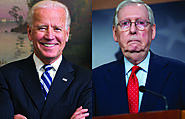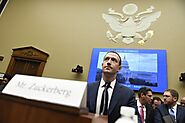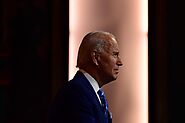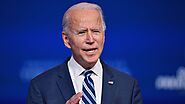-
About
- About Listly
- Community & Support
- Howto
- Chrome Extension
- Bookmarklet
- WordPress Plugin
- Listly Premium
- Privacy
- Terms
- DMCA Copyright
- © 2010-2025 Boomy Labs

Listly by drosen
The latest news and opinion on regulation and enforcement.
Source: https://sensiblesafeguards.org/

One role that remains unfilled will be vital to enacting Biden’s policy agenda: the administrator of the Office of Information and Regulatory Affairs (OIRA). Although many Americans have never heard of OIRA, the office is well known among corporate lobbyists, who take full advantage of its ability to stop regulations in their tracks. Since the Reagan administration, OIRA has earned a reputation as “the death row of well-meaning legislation.”

In a blunt deregulatory maneuver, the Trump Administration in its waning days is attempting to adopt a regulation that, if finalized, would have a cataclysmic effect on the public health and consumer protection regulatory landscape.

Many factors will determine whether President-Elect Joe Biden and Vice President-Elect Kamala Harris can deliver on their policy agenda, but few are as important as their ability to leverage the federal regulatory system. Given the prospect of a divided U.S. Congress, the most viable path for significant progress is through effective implementation of existing statutory authorities. We urge Biden and Harris to institute fundamental cross-cutting reforms for building a people-centered regulatory system that is fairer, more equitable, and more effective.

A key federal agency said this week that employers can legally require their workers to get the COVID-19 vaccine and prevent them from entering their workplaces if they refuse. The U.S. Equal Employment Opportunity Commission (EEOC) in guidance issued Wednesday said that requiring a test would not violate the Americans With Disabilities Act of 1990. The law bars employers from requiring medical exams such as blood tests that seek information on an employee’s physical or mental condition, but the EEOC said a COVID-19 vaccine does not fall under that category.

The Food and Drug Administration (FDA) on Tuesday granted emergency authorization to the first over the counter, fully at-home test for COVID-19. The move is a significant step forward in expanding the reach of rapid, at-home coronavirus tests, something experts have been advocating for months. Still, there will be limitations on supply and cost could be a barrier to widespread, repeated use.

After four years of President Donald Trump, Democrats have no shortage of “first day” ideas for President-elect Joe Biden. A team at The American Prospect recently scanned a 110-page set of recommendations published in July by the Biden-Sanders Unity Task Force and uncovered what it believes are “277 policies that are clearly within the executive branch’s power to immediately pursue, at least in part.” Biden’s wide circle of advisers have no doubt made some lists of their own. The urgency among Democrats, however, poses a knotty political dilemma for Biden. The pandemic, climate change, a faltering economy, a continuing crisis of police violence, and a seeming administrative meltdown in the Department of Homeland Security (DHS) unquestionably present a daunting menu of challenges clamoring for immediate attention. But Democrats have also spent four years railing against Trump’s absurdly broad interpretations of executive power and his pugnacious evasion of legal, political, and journalistic accountability. Any effort by Biden to change policy direction quickly will be met, whether in good faith or bad, by accusations of hypocrisy. But the president-elect has more tools for staffing the new administration and jump-starting the process of undoing Trump’s policies than may be apparent, including a tool that no president has ever used before—one that Senate Majority Leader Mitch McConnell would be powerless to block. But it’s clear that Biden’s choice of tools and how he deploys them will signal his taste for aggression in using the powers of the presidency.

For environmental justice advocates who have spent decades fighting to protect communities from polluters, the new year cannot come too soon. After four years of the Trump administration shredding the Environmental Protection Agency into “little tidbits,” as President Donald Trump put it during his first campaign, change is in the air. President-elect Joe Biden has vowed to make the climate crisis and environmental justice guiding principles of his administration from day one, Jan. 20. It’s a huge promise—and a tall order. Even as the Trump administration winds down, it is working to scale back dozens of environmental protections. In recent weeks, it has pushed to remove penalties for power plants that leak contaminants into waterways, roll back oversight of mine safety and sell oil leases in the Arctic National Wildlife refuge. The efforts cap four years of gutting or cutting more than 100 laws and policies. Environmental justice leaders want Trump’s rollbacks rescinded and renewed emphasis on justice and equity via enforcement of federal law, from the Clean Air Act to FEMA recovery aid.

We served as presidential appointees in the Office of Management and Budget under Republican and Democratic administrations, and we disagree on plenty. But we are in complete accord that OMB’s career professionals are essential for effective government. They bring deep knowledge—built up over years, sometimes decades—of how government works, which approaches to policy have succeeded or failed, and why. That’s why we are alarmed by reports that OMB Director Russell Vought has, in the waning days of the administration, reclassified 88% of the OMB’s career staff into a new Schedule F category that means they can be hired and fired at will on political grounds. The move was a hasty effort to implement an executive order from President Trump that overturned more than a century of civil service law to exert greater political control over government employees in “policy-determining, policy-making, or policy-advocating positions.”

For decades, Democrats and Republicans have disagreed on the role and size of government. No federal agency captures this fissure more than the Environmental Protection Agency (EPA) and the changing scope of environmental regulations. However, as much as political parties have disagreed, President Donald Trump’s actions are without parallel since the EPA was created 50 years ago by Richard Nixon, a Republican. Gutting more than 100 clean air, clean water and toxic chemical environmental protections, the Trump administration has taken a dangerous approach.

As the nation braces for a dark winter of COVID-19, we remain hopeful that vaccines will arrive with the spring thaw. In the meantime, foreign-born essential workers are playing a critical role during the pandemic. It’s hard to imagine surviving this crisis without their crucial contributions. Will we dismiss these essential workers who are foreign nationals when the COVID-19 health emergency is behind us?

A federal panel of outside experts on Thursday endorsed a coronavirus vaccine from Pfizer and BioNTech, and recommended the Food and Drug Administration (FDA) move forward with emergency authorization. The panel voted 17-4, with one abstention, that the safety and efficacy of the vaccine outweigh the risks for use in individuals age 16 and older. The vote is an important step, as the country is poised to start an unprecedented vaccination campaign to stop the COVID-19 pandemic. FDA doesn't necessarily have to follow the panel's recommendation, but it's widely expected to do so.

Forty-six state attorneys general and the Federal Trade Commission (FTC) on Wednesday filed lawsuits against Facebook, accusing the social media giant of anti-competitive acquisitions. The lawsuit from states — led by New York’s Letitia James (D) — alleges Facebook sought to maintain its monopoly power by acquiring potential rivals, including WhatsApp and Instagram, and that it has stifled innovation by cutting off platform services to competitors. The attorneys general from 45 other states plus D.C. and the territory of Guam joined in the lawsuit. Alabama, Georgia, South Carolina and South Dakota were not involved with the lawsuit. The legal action by such a broad coalition puts Facebook firmly in the antitrust hot seat following similar bipartisan criticisms from lawmakers in Congress.

There is ample evidence that the U.S. Environmental Protection Agency suffered a clear loss of focus, a sharp drop in morale among its career staff, and disastrous policy reversals during the Trump administration. Remedying these setbacks will take sustained and persistent effort — more akin to priming a pump than flipping a light switch. Nonetheless, if the Biden administration persistently pursues several steps, it can go a long way toward restoring the effective EPA Americans need and deserve.

The Trump administration on Wednesday finalized a rule changing how incoming administrations evaluate their air regulations, something critics say will undermine future attempts to reduce air pollution. The rule changes how the government justifies its own air pollution regulations, limiting how the Environmental Protection Agency (EPA) weighs carbon pollution that impacts climate change as well as the benefits of tackling multiple air pollutants at once.

The Biden administration will surely halt the Trump-era assault on the Environmental Protection Agency (EPA), which featured regulatory rollbacks and ruinous proposed budget cuts. But to protect the health of our nation’s people and environment, the new administration must go further — effectively enforcing our existing laws and providing adequate resources for environmental protection.

Almost two weeks ago, General Motors (GM) CEO Mary Barra handed the Biden administration its first environmental victory — two months before the president-elect will officially be sworn in. When Barra announced her company would drop its participation in a Trump administration lawsuit seeking to block California’s authority to set its own clean air standards, her surprisingly candid remarks left no doubt the decision was based on last month’s presidential election. She explicitly positioned GM as a partner with the incoming administration, assuring President-elect Joe Biden’s team that “the ambitious electrification goals of the president-elect, California, and General Motors are aligned, to address climate change by drastically reducing automobile emissions.” She even went a step further, blasting the now lame duck “Trump administration’s efforts to erode American ingenuity and America’s defenses against the climate threat.”

President Donald Trump's political appointees are finalizing an array of last-minute federal regulations ahead of Joe Biden's inauguration, including rules that would make it harder to enforce environmental protections, tighten immigration, remove penalties for killing birds, and possibly eliminate food assistance for millions of Americans. The Trump administration has already finalized more federal rules in its last year than any other recent President. And that's not even counting the regulatory activity underway since Nov. 1, a period when outgoing administrations tend to rush through "midnight regulations." A record 111 economically significant final rules were either reviewed or completed this year through Nov. 1, according to CNN analysis of federal regulation data. Another eight have been finalized since then. Fifteen remain pending under review, almost half of which have been submitted since Election Day, according to data as of Dec. 1 from the Office of Information and Regulatory Affairs.

Health care battles in Washington are going to take a new turn next year with the arrival of a Democratic president and the departure of President Trump. President-elect Joe Biden has vowed the federal government will take a far larger role on COVID-19 than the Trump administration, which mostly left the response to individual states. Biden is also likely to take unilateral action to shore up ObamaCare and undo regulations issued by Trump, and there might even be some room for bipartisan action on health care.

Our nation’s local, state and national public health agencies have endured constant attack during the COVID-19 pandemic for doing their job to protect the populace. Politicians dismiss public health and scientific expertise without rationale and discourage simple, yet effective, public health measures such as distancing and wearing a mask. The effectiveness of federal public health agencies, the Food and Drug Administration (FDA) and Centers for Disease Control and Prevention (CDC), has been diminished by political manipulations. Widespread misinformation and rejection of COVID-19 public health measures have eroded trust in public health agencies and licensed individuals to put personal freedom above the wellbeing of their fellow citizens. The result — a pandemic that rages out of control. Unfortunately, Americans have become so accustomed to the services of public health agencies that they are taken for granted. Most citizens are unaware of the fragile nature of the public health infrastructure and how perilously close that places them to serious health risks. This ignorance is borne out by the hostile response of many Americans to COVID-19 mitigation. Wearing a mask is cited as an infringement on personal freedom. Yet, our freedom comes with responsibility. The responsible act of wearing a mask prevents those who are asymptomatically infected from infecting someone for whom infection may be deadly.

A federal judge on Friday ordered the Trump administration to fully restore the Deferred Action for Childhood Arrivals (DACA) program, which protects undocumented immigrants brought to the U.S. as minors from deportation, scoring a key win for immigrant advocacy groups. The ruling from U.S. District Judge Nicholas Garaufis, a Clinton appointee, restores the Obama-era program and also mandates that the Department of Homeland Security (DHS) post a public notice by Monday saying it is accepting new applicants. It would mark the first time since 2017 that the government has admitted new immigrants into the program.

A federal judge threw out two rules by the Trump administration that limited the number of visas that are made available to skilled foreign workers. The Tuesday ruling from U.S. District Judge Jeffrey White, a George W. Bush appointee, dismisses changes the administration announced in October to the H-1B visa program, which included salary requirements on firms that employed skilled workers from overseas and placed new limits on specialty occupations. Officials defended the move as necessary because of the number of jobs lost during the coronavirus pandemic and estimated that roughly a third of H-1B visa applications would be denied. White ruled that the administration failed to properly follow transparency procedures and that its claims that the changes were an emergency response to the pandemic’s economic fallout were unsubstantiated since the October rule was implemented after months of speculation.

The Cheesecake Factory has settled charges filed by the Securities and Exchange Commission (SEC) over misleading disclosures about the impact of the COVID-19 pandemic on its business. The case marks the first time the SEC has charged a public company with misleading investors about the financial impacts of the pandemic, the agency said in a statement. The restaurant chain, without admitting the findings in the SEC order, will pay a $125,000 fine and cease and desist from further alleged violations. The SEC said Cheesecake Factory filings from March 23 and April 3 were “materially false and misleading" for saying its restaurants were “operating sustainably” during the pandemic, whereas internal documents showed the company was losing $6 million in cash per week, and that it projected that it had only 16 weeks of cash remaining. The company did not disclose the internal information in the SEC filings, but shared it with potential private equity investors or lenders in connection with an effort to seek additional liquidity, the SEC said.

The Trump administration is suing Facebook over allegations that the tech giant discriminated against U.S. workers by creating recruitment processes that favored temporary visa holders, according to a complaint filed by the Department of Justice (DOJ) Thursday. The complaint alleges that Facebook created a separate hiring process for certain temporary immigration status holders, such as H-1B visa holders, and alleges Facebook did not consider U.S. workers for more than 2,600 positions with an average salary of about $156,000. The complaint is the Trump administration’s latest action targeting a big tech company. It follows a nearly two-year investigation and targets hiring practices between Jan. 1, 2018, and Sept. 18, 2019.

Progressives are raising objections to the Biden team’s pick for overseeing the transition at a key regulatory agency in the White House, arguing the official has been too sympathetic toward President Trump’s deregulatory efforts. Bridget C.E. Dooling, a research professor at George Washington University, has been tapped to help with the agency review team at the Office of Information and Regulatory Affairs (OIRA), which reviews all executive branch regulations before they can be enacted. Critics say they’re concerned with Dooling’s prominent role given that the center where she works, George Washington’s Regulatory Studies Center, has received funding from both the Charles Koch Foundation and ExxonMobil and has long been viewed as conservative-leaning. The center is run by Susan Dudley, who led the OIRA during part of the George W. Bush administration, and its scholars have offered sympathetic analysis for some of Trump’s regulatory rollbacks.

President Trump’s Environmental Protection Agency was rushing to complete one of its last regulatory priorities, aiming to obstruct the creation of air- and water-pollution controls far into the future, when a senior career scientist moved to hobble it. Thomas Sinks directed the E.P.A.’s science advisory office and later managed the agency’s rules and data around research that involved people. Before his retirement in September, he decided to issue a blistering official opinion that the pending rule — which would require the agency to ignore or downgrade any medical research that does not expose its raw data — will compromise American public health. With two months left of the Trump administration, career E.P.A. employees find themselves where they began, in a bureaucratic battle with the agency’s political leaders. But now, with the Biden administration on the horizon, they are emboldened to stymie Mr. Trump’s goals and to do so more openly.